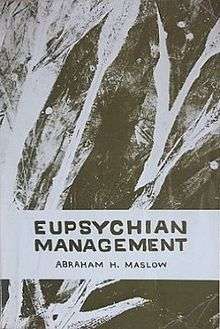Maslow on Management
 First edition (with original title) | |
| Author | Abraham Maslow |
|---|---|
| Original title | Eupsychian Management: A Journal |
| Language | English |
| Subject | Psychology |
| Publisher | R. D. Irwin (1965) |
Publication date | 1965 |
| Media type | |
| Pages | 277 |
Maslow on Management (originally Eupsychian Management: A Journal) is a work on industrial psychology by Abraham Maslow, first published in 1965. Maslow's work is frequently invoked in attempts to explain and predict work behavior.[1] In his work Maslow advocated the eupsychian (meaning moving towards psychological health or self-actualization)[2] management as the ideal model for industrial organizations.[3] Maslow took a keen interest in the application of humanistic psychology beyond one-on-one therapy to larger endeavors in organizations and education settings, where greater numbers of people could be positively affected.[4]
The idea for Eupsychian Management originated with a journal of Maslow's impressions of his 1962 observations of a California electronics plant. The study resulted in Maslow conceiving a theoretical framework on which research in the area of self-actualization may be applied to industrial organizations.[5] Not wanting to use the word "utopian", Moslow coined the term "eupsychian" to describe human-oriented institutions generated by self-actualized people. He said it could also be used to mean "moving toward psychological health". [6]
Maslow noted the commitment to work in self-actualizing people's lives: "These highly evolved individuals assimilate their work into the identity, into the self, ie, work actually becomes part of the self, part of the individual's definition of himself."[7] These most highly evolved persons would actually assimilate work as part of their personal identity.[8]
Maslow's industrial motivation theory has been criticized for tending to emphasize only identification of second-level outcomes.[9]
See also
References
- ↑ Barling, J. "A cross-cultural study of Maslow's motivation theory in industry." South African Journal of Psychology 11, no. 1 (1981): 47-50.
- ↑ Markin, Rom J., and Charles M. Lillis. "Sales managers get what they expect." Business Horizons 18, no. 3 (1975): 51-58.
- ↑ Bell, Emma, and Scott Taylor. "From outward bound to inward bound’: the prophetic voices and discursive practices of spiritual management development." Human Relations 57, no. 4 (2004): 439-466.
- ↑ O'Connor, Dennis, and Leodones Yballe. "Maslow revisited: Constructing a road map of human nature." Journal of Management Education (2007).
- ↑ Lessner, Milton, and Robert R. Knapp. "Self-actualization and entrepreneurial orientation among small business owners: A validation study of the POI." Educational and Psychological Measurement 34, no. 2 (1974): 455-460.
- ↑ Goble, Frank G. The Third Force: The Psychology of Abraham Maslow.
- ↑ Cullen, Dallas. "Maslow, monkeys and motivation theory." Organization 4, no. 3 (1997): 355-373.
- ↑ Jurie, Jay D. "Building capacity: Organizational competence and critical theory." Journal of Organizational Change Management 13, no. 3 (2000): 264-274.
- ↑ Heneman, Herbert G., and Donald P. Schwab. "Evaluation of research on expectancy theory predictions of employee performance." Psychological Bulletin 78, no. 1 (1972): 1.